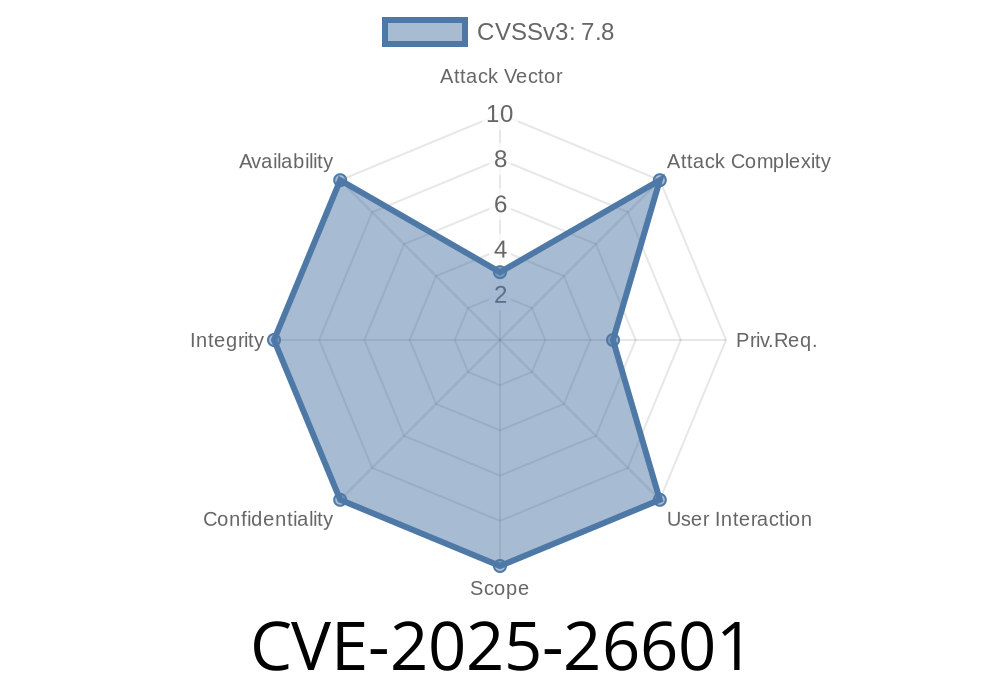A deep dive into the newly disclosed CVE-2025-26601 use-after-free vulnerability affecting X.Org and Xwayland. Read on to understand the bug, discover original links, see practical code snips, and get a clear view of real-world exploit potential.
What is CVE-2025-26601?
A newly assigned vulnerability, CVE-2025-26601, was discovered in X.Org and XWayland. It’s a use-after-free (UAF) flaw in the server’s alarm system triggered during alarm changes.
The vulnerability happens because of insufficient error handling when multiple changes are made to an alarm at once. If one change throws an error, some memory is cleaned up, but later code can still reference it.
Why This Matters
- Attackers could cause a crash (denial-of-service), read sensitive memory, or possibly execute code.
- Affects X.Org and XWayland servers used in Linux desktops, remote desktop software, and many modern UNIX-like systems.
The Bug - In Simple Code
// Simplified/illustrative code
void ChangeAlarm(AlarmPtr alarm, Mask mask, ...) {
if (mask & TRIGGER_CHANGE) {
// Maybe triggers error, frees old Trigger
if (invalid_trigger) {
free(alarm->trigger);
return; // Problem: exits early!
}
}
// More change code ...
SyncInitTrigger(alarm, new_trigger);
// At this stage, alarm->trigger might be pointing to freed memory!
}
If an error occurs midway, parts of the alarm struct are already updated, some triggers freed, but subsequent code might still access these old references.
*This is the classic “use-after-free” – using memory that’s already gone.*
Denial-Of-Service is the easiest: an attacker triggers the bug, causing the X server to crash.
- Info leak/possible code execution: If the freed memory is reallocated for attacker-controlled data, the alarm handler might operate on evil values.
Triggering scenario: By crafting a sequence of X11 protocol messages that change an alarm and intentionally cause a trigger-related error, an attacker can reliably set up the bug.
Proof-of-Concept (PoC) Demo – For Research
*WARNING: Running this may crash your Xorg server! Do not try on a production machine.*
Here’s a simplified Python script using python-xlib
from Xlib import X, display, Xatom, protocol
d = display.Display()
root = d.screen().root
# Setup: create alarm with an initial trigger value
alarm_id = d.allocate_resource_id()
#... setup call here (elided)
# Now, try to change alarm with an invalid trigger
dangerous_mask = x1 | x2 # mask says change trigger + something else
# Malicious request: provide a bad trigger value
req = protocol.request.Request(
display=d.display,
opcode=YOUR_OP_FOR_ALARM_CHANGE, # Find from protocol
data=construct_bad_alarm_payload(alarm_id, dangerous_mask),
)
req()
# If server unpatched, this can crash Xorg/Xwayland
*You’ll need to study the X Sync extension protocol to craft real alarm requests.*
Fixed in
- xorg-server commit 9feb2ef
- Check the X.Org security advisory for update versions.
Set up strong sandboxing for X11 clients.
- Consider using Wayland, which has a stronger security model.
More References
- X.Org Security Advisory (2025-03)
- freedesktop.org Gitlab issue
- CVE Details
Final Thoughts
CVE-2025-26601 is a classic but serious bug in a critical piece of Linux infrastructure. If you run X.Org or Xwayland, update immediately! Attackers with local access or an ability to send crafted X11 requests can trigger use-after-free crashes or, in worst cases, potentially gain code execution.
As always, sandbox your critical services and watch those security advisories.
*Stay secure. Share this post with your sysadmin friends!*
Timeline
Published on: 02/25/2025 16:15:39 UTC
